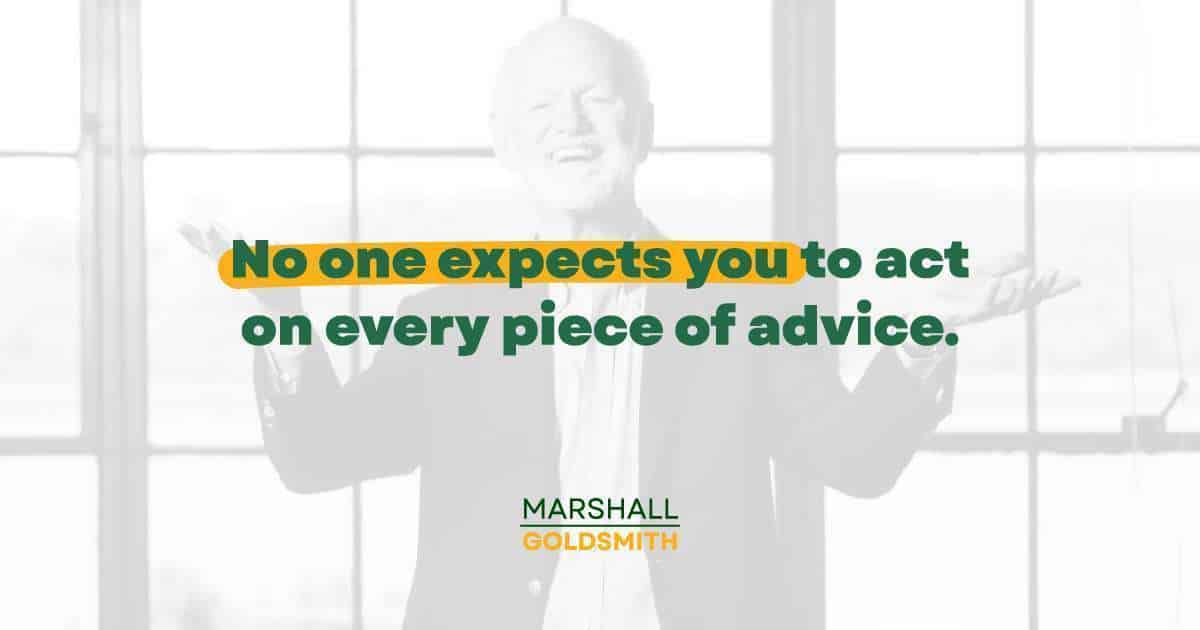Playing Favorites By Marshall Goldsmith There’s a reason I devote...
In my New York Times best-selling book, What Got You Here Won’t Get You There, the concept is that rather than being successful because of all of our behaviors, sometimes we are successful in spite of them.
In our discussion this week, best-selling author of Now Build a Great Business, Success Built to Last, and Admired, #1 CEO Coach, and member of our 100 Coaches pay-it-forward initiative, Mark Thompson, asks me about the bad habit of “adding too much value”.
Mark: . When you think about this concept of adding too much value, one of the big principles in What Got You Here Won’t Get You There, what did you mean by that?
Marshall: This is a counterintuitive concept. Let’s imagine that you’re my boss. I’m young, smart, enthusiastic. I come to you with an idea. You think it’s a great idea. Rather than just saying, “great idea,” our natural tendency is to say, “well, that’s a nice idea. Why don’t you add this to it?” The problem with this is that the quality of the idea may go up by 5%. My commitment to execute may go down 50%.
My good friend David Ulrich taught me that effectiveness of execution as a function of A (what’s the quality of the idea times B (what’s my commitment to make it work?). We can get so wrapped up trying to improve the quality of the idea a little that we may damage their commitment a lot.
One of my coaching clients retired a few years ago. His name, JP Garnier. JP was the CEO of a very large drug company, GlaxoSmithKline. I asked JP, “what’d you learn about leadership as a CEO of this huge company?” He said, “I have learned a very, very hard lesson. And every time the people listening to us get promoted in life, every time they become more powerful, this lesson becomes more real. He said, “my suggestions become orders. If they’re smart, they’re orders. If they’re stupid, they’re orders. If I want them to be orders, they’re orders. And if I don’t want them to be orders, they’re orders anyway.”

I asked JP, “what’d you learn from me when I was your executive coach?” He said, “you taught me one lesson that helped me be a better leader and have a happier life. Before I speak, stop and breathe, and ask myself one question: is it worth it? As the CEO, if I had the discipline to stop and to breathe and to ask myself, ‘is it worth it? What did I decide? Am I right? Maybe. Is it worth it? No, no.”
Mark: It’s a powerful idea, because usually people are so anxious to give that great idea. And, as the leader, I’ve got the experience, and I also don’t want to see them fail. There’s lots of reasons to get engaged in adding too much value. It’s a great idea.
When you think about that principle, what question would you ask all the people who are listening and watching this today?
Marshall: I’d like to our audience to tell us of a time when they tried to add value and it was too much value. Was it worth it? I love getting case studies, and I’d love to hear it.

Adding Too Much Value Won’t Get You There By Marshall...
C-Suite Master Class: No, But, However By Marshall Goldsmith Continuing...
The Doerr Institute: Expanding the Market for Coaches By Marshall...
Making Leadership Development Part of the College Degree at Rice...
Sanyin Siang – Winner of the Thinkers50 Marshall Goldsmith Coaching...
Thinkers50 Marshall Goldsmith Distinguished Achievement Award in Coaching – Nominees...
Leading with Influence: What Is Influence360°? By Marshall Goldsmith Founder...
Are You a Dominator, Manipulator, Persuader or Influencer? By Marshall...
Leading with Influence: Redefining Modern Influence Part 2 By Marshall...
Adding Too Much Value Won’t Get You There By Marshall...
C-Suite Master Class: No, But, However By Marshall Goldsmith Continuing...
The Doerr Institute: Expanding the Market for Coaches By Marshall...
Making Leadership Development Part of the College Degree at Rice...
Sanyin Siang – Winner of the Thinkers50 Marshall Goldsmith Coaching...
Thinkers50 Marshall Goldsmith Distinguished Achievement Award in Coaching – Nominees...
Leading with Influence: What Is Influence360°? By Marshall Goldsmith Founder...
Are You a Dominator, Manipulator, Persuader or Influencer? By Marshall...
Leading with Influence: Redefining Modern Influence Part 2 By Marshall...
My mission is simple. I want to help successful people achieve positive, lasting change and behavior; for themselves, their people, and their teams. I want to help you make your life a little better. With four decades of experience helping top CEOs and executives overcome limiting beliefs and behaviors to achieve greater success, I don’t do this for fame and accolades. I do this because I love helping people!
As an executive educator and coach, I help people understand how our beliefs and the environments we operate in can trigger negative behaviors. Through simple and practical advice, I help people achieve and sustain positive behavioral change.